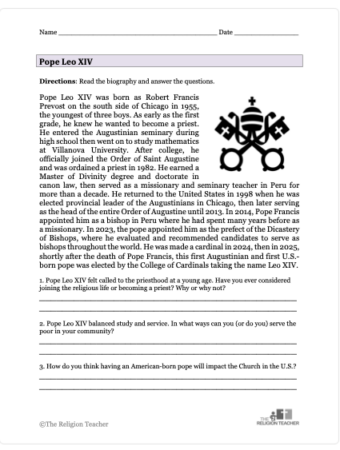Hope in Meditating on Salvation
We have hope in a salvation that will be an unknown experience and mostly indescribable. Many of our students have an understanding of this experience that is based on their exposure to the entertainment industry. Rather than strengthen their desire for salvation, these movies and books often limit their understanding of the experience of heaven to a place in the clouds where people live a life very much like this one. It is the undefined qualities of salvation that make it worth our hope.
How do we teach our students to hope for something greater than the images of heaven they see on TV or in movies? Pope Benedict writes that eternal life is “something like a supreme moment of satisfaction” (Spe salvi, n. 12). It is a moment that is outside of time and therefore not something that would bore us after awhile. We can attempt to experience this through prayer, but we can never completely reach the level of overwhelming love that would characterize the experience of heaven. Begin by asking your students to think of a moment of supreme happiness and joy or, if you like, the happiest moment of their lives. Once you have given them enough time to think of their memory, invite them to explore it by asking them to remember what they saw, heard, smelled, touched, or tasted. Then have them focus on the emotions in their memory by asking them to think of words that would describe how they felt (you may even ask them to quietly say them out loud). Ask them to imagine sharing that feeling with their closest family members or friends so that these people would also be feeling the same way. Finally, ask them to imagine Jesus being there sharing in the experience as well. Explain to them that they are now experiencing a taste of the joy of heaven.
An important part of successfully directing any meditation is to use good voice inflection and to give them time to reflect on the directions you are giving. For this particular meditation it is important that they choose one moment and stick with it rather than spending most of the time trying to decide which moment to choose. After the meditation, it would be very helpful to lead them in a discussion about what heaven will be like based on their prayer experiences. Be careful not to make this the focus of the activity, however, because that discussion may weaken the hope in your students rather than strengthen it. These discussions look for answers that inform, but do not necessarily change hearts. Learning how to hope is not an informative process, it is performative. Hope is something that you can teach about in your classes, but its true meaning can be truly learned and experienced through prayer. I think Pope Benedict XVI would agree that one of the greatest gifts that we can give to our students is not information about hope, but access to its performative power.
Read the Rest of this Series:
Part I: Learning Hope Through Prayer
Part II: Hope in Prayer Intentions
Part III: Hope in “Offering Up”


